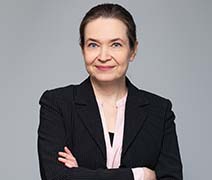Composition of the Board
In accordance with the proposal of the Shareholders’ Nomination Committee, the 2025 Annual General Meeting elected nine members to the Board of Directors for the 2025 – 2026 term.

- B. 1964, male
- Education: M.Sc. (Econ.)
- Primary occupation: Board professional and financial consultant
- Other material positions of trust: Chair of the Board of Directors at Emittor Oy, Chair of the Board of Directors at Lauvest Oy (consultancy firm owned by Mr. Laukkanen)
- Independence: Independent of the company and its significant shareholders
- Member of the Board since 2018
Long and diverse international banking experience in various positions at a global banking group (Citigroup, 1990–2016, last 13 years Managing Director, Citi Country Officer of the Finnish branch).

- B. 1967, female
- Education: M.Sc. (Econ.), CEFA
- Primary occupation: Deputy CIO, COO, Investments, Keva
- Other material positions of trust: Member of the Advisory Committee for Investments at the University of Oulu (non-commercial position), Church Pension Fund, deputy member of the Board
- Independence: Independent of the company, not independent of its significant shareholders (employed by a significant shareholder)
- Member of the Board since 2019
Long and diverse experience in capital market tasks at Keva, Finland’s largest occupational pension insurance company (since 1998), and before that as portfolio manager and economist in the banking sector (Merita 1996–1998) and as an economist at the Bank of Finland (1994–1996).

- B. 1972, female
- Education: Master of Laws with court training, M.Sc. (Econ.), CESGA (Certified ESG Analyst by EFFAS)
- Primary occupation: Senior Ministerial Adviser at the Ownership Steering Department of the Prime Minister’s Office
- Other material positions of trust: Suomen Rahapaja Oy, Chair of the Board, Governia Oy, Chair of the Board, GoK Oy (subsidiary company of Governia), Chair of the Board, Ruotu Oy, member of the Board (non-commercial position)
- Independence: Independent of the company, not independent of its significant shareholders (employed by a significant shareholder)
- Member of the Board since 2025
Before the current primary occupation, extensive experience in private equity investment (Sentica Partners Oy, 2007–2023) in various roles, including leading financial and investor communications. Prior to this, experience in legal expert roles. Board member in several companies owned by private equity investors.

- B. 1962, male
- Education: M.Sc. (Tech.)
- Primary occupation: Board professional
- Other material positions of trust: Apotti Oy, Chair of the Board, Tekniikan edistämissäätiö, Chair of the Board (non-commercial position), Tekniikan Akatemia -säätiö, Member of the Board (non-commercial position), Member of the Board at Midagon Group Oy and Midagon Group Holding Oy
- Independence: Independent of the company and its significant shareholders
- Member of the Board since 2025
Extensive experience in IT management positions at OP Financial Group (2015–2022) and previously in the industrial sector (ZenRobotics, 2015–2017; Kone, 2006–2012), as well as in leadership roles at the Finnish operations of an international consultancy firm (1999–2006). Board experience in both publicly listed companies (F-Secure Plc, QPR Software Plc) and unlisted companies (Kuntien Tiera Oy, Kemppi Oy, Finanssikontio Oy, Paja Finanssipalvelut Oy).

- B. 1972, male
- Education: M.Sc. (Econ)
- Primary occupation: director, Economy and Planning Department, City of Helsinki
- Other material positions of trust: no other material positions of trust
- Independence: Not independent of the company and its significant shareholders (employed by a significant shareholder and customer)
- Member of the Board since 2021
Long experience of executive-level financial responsibilities at the City of Helsinki since 2000. Finance Manager since 2014.

- B. 1983, male
- Education: M.Sc. (Econ.)
- Primary occupation: Director of Finance, City of Porvoo
- Other material positions of trust: Keskinäinen kiinteistö Oy Porvoon Piispantalo, member of the Board (non-commercial position), Mainio Fructus Oy, member of the Board
- Independence: Independent of the company and its significant shareholders
- Member of the Board since 2025
Before the current position, extensive experience in the Finnish municipal sector and related advocacy while serving in various roles at the Association of Finnish Cities and Municipalities (Suomen Kuntaliitto) from 2008 to 2019.

- B. 1979, female
- Education: M.Sc. (Econ.)
- Primary occupation: CFO, Enento Group Plc
- Other material positions of trust: Board memberships in companies belonging to the Enento Group (calculated as one directorship)
- Suomen Asiakastieto Oy
- UC Ab
- Emaileri Oy
- UC Affärsinformation Ab
- Independence: Independent of the company and its significant shareholders
- Member of the Board since 2024
Extensive experience (since 2004) in expert and leadership roles in auditing and financial management (EY, Fortum, Finnair Oy). Member of the Audit Board of the Finnish Patent and Registration Office from 2019 to 2021.

- B. 1961, female
- Education: Soc.Sc (political sciences), MBA
- Primary occupation: Board professional
- Other material positions of trust: Member of the Board of Directors at Veikkaus Oy, Member of the Board at YIT Oyj
- Independence: Independent of the company and its significant shareholders
- Member of the Board since 2021
Long and diverse experience in executive-level positions at the financial sector. Country Manager at Danske Bank (2018–2020), other executive-level positions at Danske Bank since 2011 and at Nordea and its predecessors since 1988.

- B. 1963, male
- Education: M.Sc. (Tech.)
- Primary occupation: Operational and financial director, City of Tampere
- Other material positions of trust: Member of the Board of Directors at the Tor, Joe and Pentti Borg Foundation (non-commercial position), Tampereen ammattikorkeakoulun tukisäätiö sr, Member of the Board (non-commercial position)
- Independence: Non-independent of the company, independent of its significant shareholders (employed by a significant customer)
- Member of the Board since 2023
Experience in financial management positions at the City of Tampere since 2007. Prior experience in expert and managerial positions in credit granting and customer relations in the banking sector (Nordea, Handelsbanken) since 1991.
Activities of the Board
The Annual General Meeting elects the members of the Board, whose term ends at the conclusion of the next Annual General Meeting. The Shareholders’ Nomination Committee is responsible for annually preparing a proposal to the Annual General Meeting regarding the composition of the Board.
The Board selects a chair and vice chair from among its members. Their term lasts until the conclusion of the next Annual General Meeting. The Shareholders’ Nomination Committee makes a proposal to the Board regarding the election of the chair and vice chair.
Shareholders holding more than ten percent of the company’s voting rights may propose Board members to the Annual General Meeting. Such proposals must be made in due time to be included in the summons to the Annual General Meeting.
There are no restrictions on the number of terms a Board member can serve. Board members are eligible for re-election at the end of their term. In the event of a resignation or permanent impediment occurring during a term, a new member may be elected at the Annual General Meeting or an Extraordinary General Meeting to serve for the remaining term.
According to the Articles of Association, the Board of Directors consists of a minimum of five and a maximum of nine ordinary members.
A majority of the Board members must be independent of the company, and two of these independent members must also be independent of the company’s significant shareholders. Independence is assessed based on criteria established in the Finnish Corporate Governance Code for listed companies.
Board members must be reliable, of good repute and competent in accordance with the legislation applicable to credit institutions. Board members must have sufficient time to perform their duties.
In accordance with the rules of procedure of the Shareholders’ Nomination Committee, the Board should have expertise in the following areas:
- International financial markets
- Lending
- Risks related to the financial industry
- Municipal finance and municipal community operations
- Affordable social housing production
- Corporate governance
The CEO and the Deputy CEO cannot be elected as Board members.
In accordance with the Finnish Limited Liability Companies Act, the Board of Directors sees to the administration of the company and the appropriate organisation of its operations (general competence). The Board is also responsible for all other duties specified for it in the Limited Liability Companies Act and other legislative provisions and regulations issued by the authorities.
The Board’s duties and operating principles are outlined in the Board’s rules of the procedure.
The Board’s main duties include the following:
- Defining the company’s strategy, taking into account sustainability and the company’s risk profile.
- Approving the annual operational plan and budget.
- Monitoring the company’s financial situation and ensuring through supervision that governance, and risk management in particular, are appropriately organised by the management.
- Confirming the company’s values and ethical principles.
- Approving policies that guide the company’s operations.
The Board also makes decisions on matters of significant importance regarding the nature and scope of the company’s activities. The external auditor and internal audit report directly to the Board to provide independent information about the company’s condition.
The Board of Directors is responsible for the appointment and termination of employment of the CEO and the Deputy CEO and decides on the principles of the company’s remuneration system.
The Board conducts an annual self-assessment of its performance fulfilling its duties.
MuniFin is a nationally systemically important institution (O-SII) as defined in the Act on Credit Institutions. In accordance with legal requirements, the Board has established audit, risk and remuneration committees. The Board selects the members and chairs of these committees from among its members. Each committee must have a minimum of three members, and no two committees may consist entirely of the same members. Committee members are required to possess the expertise and experience necessary to fulfil the committee’s responsibilities. The committees regularly report on their activities to the Board.
The Board may also establish other committees as needed.
Members of the Audit Committee
Elina Stråhlman, Chair
Liisa Harjula
Kari Laukkanen
Henrik Rainio
The Audit Committee assists the Board in matters related to financial reporting and internal control. It also oversees the internal and external auditing.
The responsibilities of the Audit Committee are detailed in its rules of procedure. The duties of the Audit Committee include:
- Monitoring the effectiveness of the company’s internal control and risk management.
- Overseeing financial reporting methods.
- Evaluating the quality and appropriateness of the company’s financial statements and the information contained therein.
- Preparing the proposal for the selection of the auditor and their remuneration.
- Assessing the audit plan and the auditor’s reporting.
- Evaluating the effectiveness and independence of the auditor.
- Monitoring compliance with the company’s Corporate Governance Policy.
- Preliminary review of significant investment proposals before Board approval.
The Audit Committee may provide the Board with recommendations and proposals related to its responsibilities as needed.
The internal audit reports to the Audit Committee on its activities. The Audit Committee assesses the internal audit plan, supervises the operation and efficiency of the internal audit and the implementation of audit recommendations. The Audit Committee also prepares for the Board proposals on selecting or dismissing the head of internal audit.
The composition of the Audit Committee should ensure its independence. According to the Act on Credit Institutions, at least one member must be independent of the credit institution and its significant shareholders, with sufficient expertise in accounting or auditing. Furthermore, the Corporate Governance Code requires that a majority of the Audit Committee members be independent of the company and that at least one member be independent of the company’s significant shareholders. The Audit Committee should have sufficient expertise in accounting, bookkeeping, financial reporting and practices concerning financial statements as well as internal audit.
Members of the Risk Committee
Leena Vainiomäki, Chair
Maaria Eriksson
Juho Malmberg
Arto Vuojolainen
The Risk Committee assists the Board in matters related to the company’s risk strategy and overall risk appetite. The Risk Committee considers all key types of risks in its work, including ESG risks.
The responsibilities of the Risk Committee are detailed in its rules of procedure. The duties of the Risk Committee include:
- Ensuring that the executive management complies with the risk strategy determined by the Board.
- Assessing whether the prices charged by the company for services that tie up capital are equivalent to the business model and risk strategy. If not, preparing a plan for the Board to address this issue.
- Assisting the Board’s Remuneration Committee in creating sound remuneration systems.
- Evaluating whether the incentives provided by the remuneration system take into consideration the institution’s risks, capital and liquidity requirements, and the likelihood of earnings distribution and earnings accumulation.
The composition of the Risk Committee should ensure its independence. A majority of its members, including the Chair, must be independent. The Chair of the Risk Committee cannot be the Chair of the Board or the Chair of another committee. Members of the Risk Committee must have the appropriate knowledge, expertise and understanding of risk management and control practices.
Members of the Remuneration Committee
Kari Laukkanen, Chair
Maaria Eriksson
Tuomo Mäkinen
Leena Vainiomäki
The Remuneration Committee’s task is to assist the Board in decisions related to the administration and guidance of remuneration systems.
The responsibilities of the Remuneration Committee are detailed in its rules of procedure. The duties of the Remuneration Committee include:
- Overseeing employee remuneration as a whole, taking into account gender neutrality and equality matters in general.
- Preparing decisions related to remuneration and benefits.
- Assessing the effectiveness of the company’s remuneration system and preparing changes related to its development.
- Preparing the nomination and remuneration of the CEO, the deputy to the CEO, the members of the Executive Management Team, the Head of Internal Audit and other employees who report directly to the CEO.
The composition of the Remuneration Committee should ensure its independence. According to the Corporate Governance Code, a majority of the Remuneration Committee’s members must be independent of the company. The Chair of the Committee must be independent. The Committee shall collectively have appropriate knowledge, expertise and professional experience concerning the remuneration policies and practices, risk management and control activities, namely with regard to the mechanism for aligning the remuneration structure to MuniFin’s risk and capital profiles.